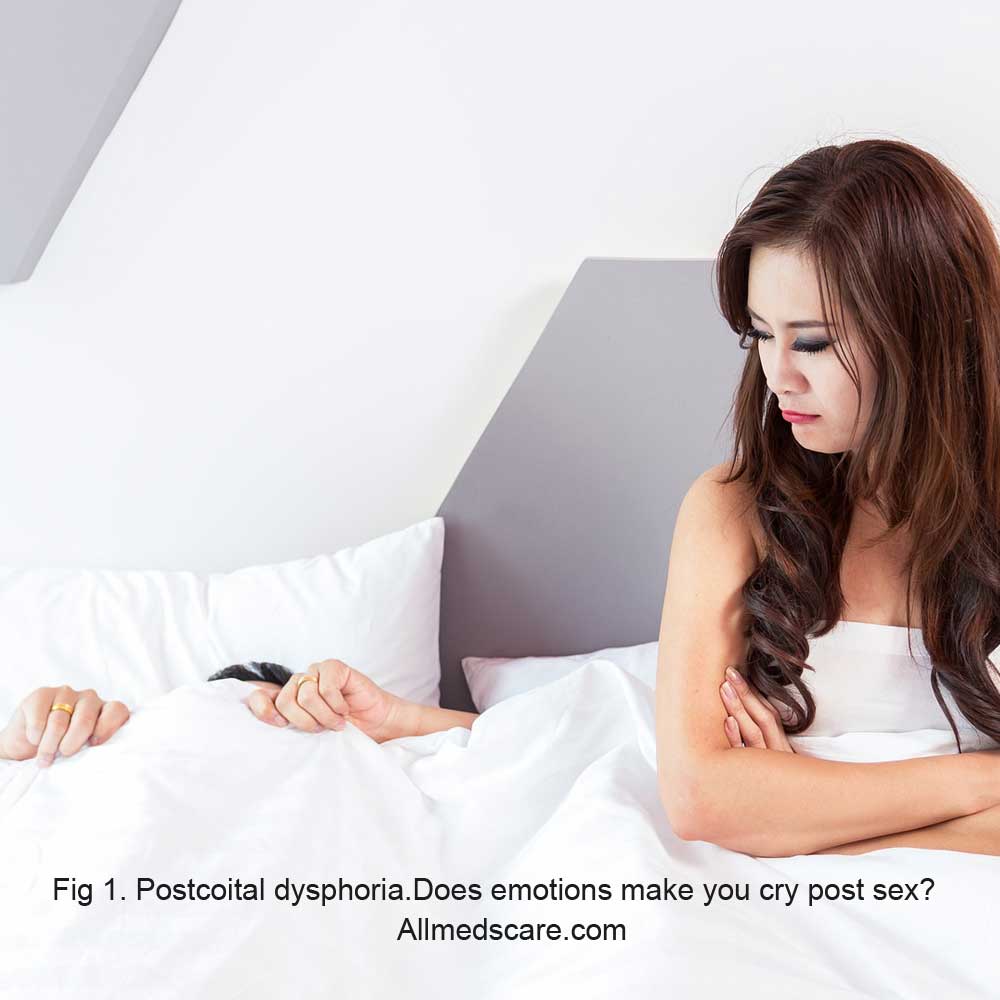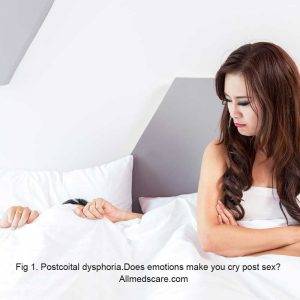
Postcoital dysphoria. Does emotions make you cry post sex?
Postcoital dysphoria (PCD) is a condition where a person feels sad, anxious, irritable or aggressive immediately following consensual sexual activity. Such conditions may happen in any gender. Yet, in most cases, women experience Postcoital dysphoria more often.
Symptoms may include tearfulness, restlessness and feeling disconnected from oneself and the partner involved in the experience. Postcoital tristesse (PCT) is similar but not identical to PCD; PCT occurs after sex more frequently than PCD does but its effects are usually less intense.
The symptoms associated with PCD can vary for each individual ranging from mild distress to severe depression that requires medical attention. Some common signs of PCD include crying without explanation, feeling overwhelmed or agitated, difficulty concentrating on tasks at hand as well as an overall sense of emptiness or disconnection from one’s self and their partner involved in the experience.

What causes Postcoital dysphoria?
Hormonal Changes
The main reason why most of them experience postcoital dysphoria is because of hormonal changes. Sexual activity often causes hormones to activate in the body. Dopamine and oxytocin are good examples of this. The changes in dopamine and oxytocin hormones can trigger a range of emotions including euphoria and contentment.
When these hormones are released in excessive amounts or at an inappropriate time they can lead to feelings of sadness or distress after sex. This often leads to feelings of sadness and leftover after sex resulting in tears in the eyes.
Sometimes hormonal imbalances caused y medical conditions like polycystic ovary syndrome (PCOS) may also contribute to PCD symptoms.
Mental Health
Mental health issues can play a major role in the development of PCD. People with anxiety or depression are more likely to experience PCD than those without mental illness. Such conditions may be exacerbated by factors such as stress or relationship problems that could arise following sexual activity.
Sex is not just a 2 minutes game. It is a time when both parties get well connected emotionally, physically and mentally. In such conditions leaving your partner alone immediately after having sex may result in tears in your eyes. The reason may be the feeling of being used only for the purpose of sex.
Additionally, some individuals may feel guilty about their behavior during sex, sexual abuse or previous bad experience from sex are also closely associated.
Lifestyle
Sexual activity often helps to calm down the mind to a peaceful state. This can immediately trigger stress caused by lifestyles such as work-related problems, financial difficulties or other sources of difficulty from family or relationships.
How to diagnose Postcoital dysphoria?
During the physical exam, the doctor will check for signs indicating hormonal imbalances or underlying medical conditions that could be causing PCD.
Additionally, a psychological evaluation may also be conducted to check if any emotional distress or mental health issues are contributing factors to PCD.
In this type of assessment, patients are asked a few questions about their thoughts and feelings before and after sexual activity. Few more questions about the cause of stress or relationship problems they experience recently.
Once all relevant information has been gathered from the patient’s history and examination, doctors can then make an accurate diagnosis of PCD. After confirming a diagnosis of postcoital dysphoria treatment options can be tested to allow couples to enjoy sex without feeling overwhelmed afterward.
Partner support is a very important part of treatment. One should make sure that they do not leave their partner immediately after having sex. Try making post-sex time enjoyable and comfortable.
Treatment option available
In most cases, the reason is closely associated with mental health and trauma. Hence talk therapy works best in the initial stage. By engaging in psychotherapy, individuals can work through their feelings and explore the underlying causes of their PCD. Doctors can better know about their relationships such as conflicts or any guilt associated with sexual activity.
Talk therapy helps solve Postcoital dysphoria caused due to mental health issues. Making things clear with a partner, ending up conflicts on time and sharing day-to-day problems can often help to a greater extent.
If talk therapy fails to control feelings of depression or anxiety certain medications may be prescribed in such conditions Medications that alleviate symptoms of depression or anxiety such as Antidepressants, anxiolytics (anti-anxiety drugs) or medications used for mood enhancement have been found to help reduce feelings of sadness and distress associated with PCD.
Yoga or mindfulness exercises may also be beneficial for those dealing with postcoital dysphoria. These activities can help individuals have great control over their emotions. Natural treatment method such as acupuncture has been known to increase endorphin levels. This can also help overcome emotional downfall.
In cases where hormone changes result in Postcoital dysphoria medications to keep hormones under control can be suggested depending on the individual cases.
Prevention
Postcoital dysphoria can be prevented with a little bit of adding healthy habits to life that promote emotional well-being. Such health disorders are often related to mental health. Hence stress management is key to maintaining good mental health in order to prevent PCD.
As mentioned above engaging in activities such as yoga, meditation or even light exercise can help reduce stress levels and make it easier for individuals to have control over emotions. Additionally, maintaining a balanced diet full of nutritious foods can improve one’s overall mood which may help prevent feelings of sadness or emptiness after sex.
It is important to develop bonding between the partners. What has happened in past is the past, couples should start new. Try not to bring the previous fights in present. Solving a conflict on time is best. Developing an intimate connection with a partner is also important when trying to reduce the risk of experiencing postcoital dysphoria.
Sex allows couples to know each other intimately outside the bedroom by talking about their hopes, dreams, and desires as well as discussing any potential issues between them that could be contributing factors towards PCD. Building faith and trust within a relationship will not only benefit both partners mentally but will also create a stronger bonding at all times.
Finally, couples who might be at risk for developing PCD should speak openly about how they are feeling before, during, and after. If something is triggering stress and sadness both parties should stick together and try to solve those problems.






